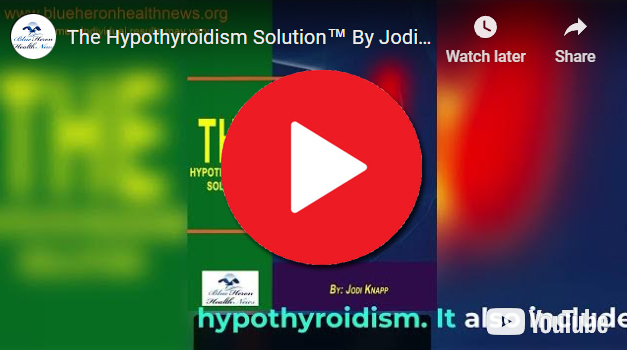
The Hypothyroidism Solution™ By Jodi Knapp Jodi has provided a stepwise guide in the form of The Hypothyroidism Solution to help you in regulating the levels of your thyroid in a better and natural way. Along with curing hypothyroidism, it can also care a number of other health issues experienced by people all over the world. No side effect due to this program has been reported so far. So you can follow this program without any financial as well as emotional risk.
What role does iodine deficiency play in hypothyroidism?
Iodine is an essential nutrient that plays a critical role in thyroid function and hormone production. The thyroid gland uses iodine to produce the thyroid hormones thyroxine (T4) and triiodothyronine (T3), which are vital for regulating metabolism, growth, and development. Iodine deficiency can lead to hypothyroidism by impairing the thyroid gland’s ability to produce these hormones. Here’s how iodine deficiency contributes to hypothyroidism:
1. Impaired Thyroid Hormone Production
- Essential Component: Iodine is a key component of the thyroid hormones T3 and T4. Without sufficient iodine, the thyroid gland cannot produce adequate levels of these hormones.
- Hormone Deficiency: When iodine intake is insufficient, the production of T3 and T4 decreases, leading to hypothyroidism. The body’s metabolism and various physiological processes slow down due to the lack of thyroid hormones.
2. Goiter Formation
- Thyroid Enlargement: In response to low iodine levels, the pituitary gland increases the production of thyroid-stimulating hormone (TSH) to stimulate the thyroid gland to produce more hormones. However, without enough iodine, the gland cannot produce sufficient T3 and T4, even with elevated TSH levels.
- Compensatory Growth: The thyroid gland may enlarge in an attempt to capture more iodine from the bloodstream, leading to the formation of a goiter (an enlarged thyroid gland). While goiter itself is a sign of iodine deficiency, it can also be associated with hypothyroidism if the gland remains unable to produce enough hormones.
3. Congenital Hypothyroidism
- Maternal Iodine Deficiency: During pregnancy, iodine deficiency can lead to congenital hypothyroidism in the newborn. If a pregnant woman does not consume enough iodine, her fetus may not receive sufficient thyroid hormones, which are crucial for brain development and growth.
- Developmental Impact: Congenital hypothyroidism can result in severe developmental issues, including intellectual disabilities and growth retardation if not detected and treated early. Newborn screening programs in many countries test for thyroid function to prevent these outcomes.
4. Public Health and Iodine Fortification
- Iodine Deficiency Disorders (IDD): Iodine deficiency is a leading cause of preventable intellectual disabilities and developmental disorders globally. In areas where iodine deficiency is prevalent, rates of hypothyroidism and goiter are higher.
- Iodized Salt: To combat iodine deficiency, many countries, including the United States, have implemented iodized salt programs. This public health measure has significantly reduced the incidence of iodine deficiency-related hypothyroidism in many populations.
5. Vulnerability in Certain Populations
- Geographical Risk: Populations living in areas with iodine-deficient soil, such as mountainous regions, are at higher risk of iodine deficiency and related hypothyroidism. Without adequate dietary iodine or supplementation, these populations may experience higher rates of hypothyroidism.
- Dietary Habits: People who avoid iodized salt, have limited access to iodine-rich foods (like seafood, dairy, and eggs), or follow strict diets that exclude iodine sources (such as some vegan or low-sodium diets) are also at increased risk of iodine deficiency and hypothyroidism.
6. Balance Between Deficiency and Excess
- Iodine Excess: While iodine deficiency can lead to hypothyroidism, excessive iodine intake can also cause thyroid dysfunction, including hypothyroidism. The thyroid gland may reduce hormone production in response to very high iodine levels, leading to a condition known as the Wolff-Chaikoff effect. This underlines the importance of maintaining a balanced iodine intake.
7. Global Health Perspective
- Endemic Goiter and Hypothyroidism: In regions where iodine deficiency is endemic, such as parts of Africa and Asia, large segments of the population may suffer from goiter and hypothyroidism due to insufficient iodine intake. Public health initiatives in these regions often focus on iodine supplementation to prevent these conditions.
In summary, iodine deficiency directly contributes to hypothyroidism by impairing the thyroid gland’s ability to produce the necessary thyroid hormones. While public health measures like iodized salt have reduced the prevalence of iodine deficiency-related hypothyroidism in many parts of the world, it remains a significant concern in certain populations and regions. Proper iodine intake is essential for maintaining normal thyroid function and preventing hypothyroidism.

The Hypothyroidism Solution™ By Jodi Knapp Jodi has provided a stepwise guide in the form of The Hypothyroidism Solution to help you in regulating the levels of your thyroid in a better and natural way. Along with curing hypothyroidism, it can also care a number of other health issues experienced by people all over the world. No side effect due to this program has been reported so far. So you can follow this program without any financial as well as emotional risk.